New Year Lectures from Astronomical Software Masters
走进天文软件的“无冕之王”
Lectures Overview
| Data and Time (UTC) | Beijing Time | Title | Speaker |
| 2021-01-11 08:00 | 16:00 | Introduction to TOPCAT | Mark Taylor |
| 2021-01-18 08:00 | 16:00 | SIMBAD, VizieR and Aladin: the CDS astronomical tool suite | Pierre Fernique |
| 2021-01-26 01:00 | 09:00 | Advanced features of SAOImageDS9 | William Joye |
| 2021-02-01 08:00 | 16:00 | Stellarium: astronomical simulation for research and outreach | Georg Zotti |
bilibil直播网址:https://live.bilibili.com/22723375 (房间号:22723375)
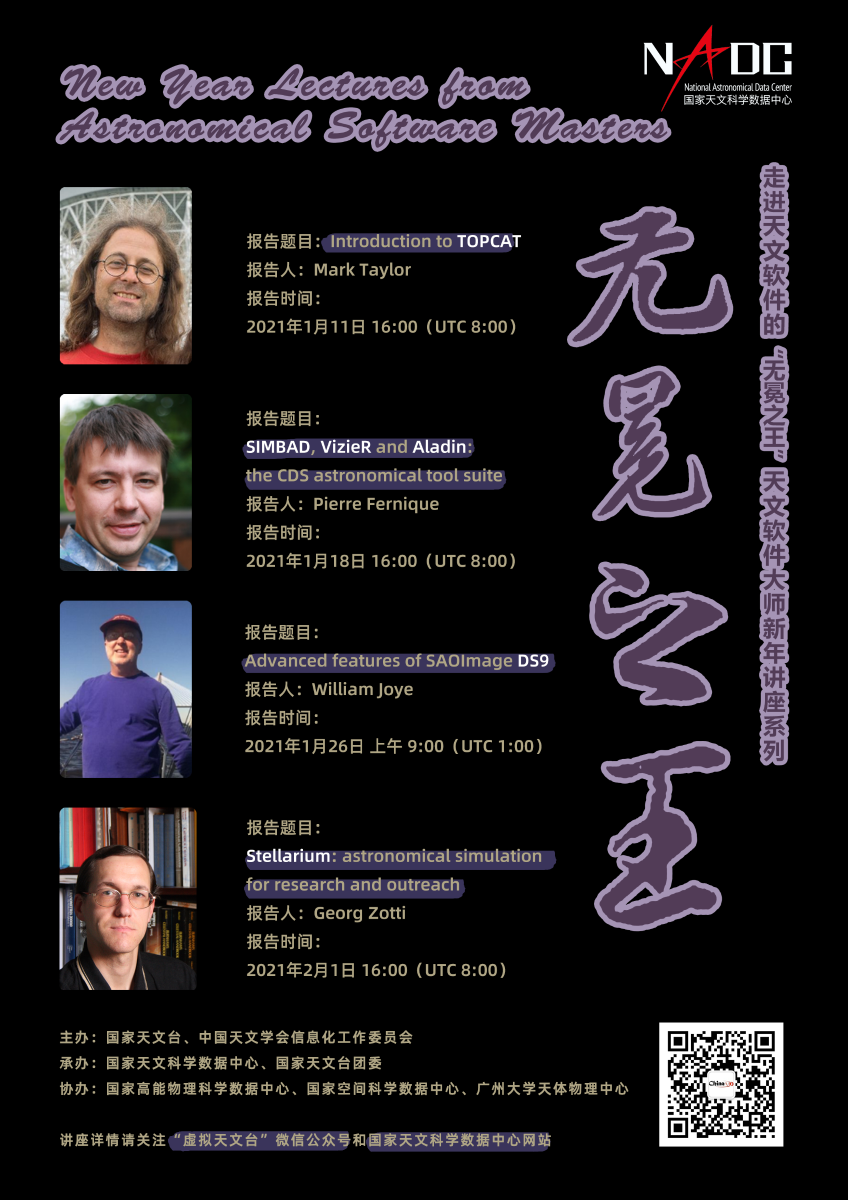
活动组织(Organization )
主办:国家天文台、中国天文学会信息化工作委员会
承办:国家天文科学数据中心、国家天文台团委
协办:国家高能物理科学数据中心、国家空间科学数据中心、广州大学天体物理中心
Lecture one
- Title: Introduction to TOPCAT (slides)
- Time: 8:00 UTC on Jan. 11, 2021 (16:00 Beijing Time)
- ZOOM Link: lecture ended
- Offline Meeting Room: NAOC A408
- Recordings: YouTube, B站
- Speaker: Mark Taylor
- Short Bio:
Author of TOPCAT and other software, astronomical software programmer in the Astrophysics Group of the School of Physics at the University of Bristol. Since 1998 he has been writing astronomical software, within the Starlink, AstroGrid, and various Euro-VO projects. The main focus of his work is currently processing of and access to tabular data such as astronomical source catalogues, and application interoperability, particularly in the context of the Virtual Observatory (VO), and also of data from the Gaia astrometry satellite. Mark is active within the IVOA, an international body which defines standards for the VO.
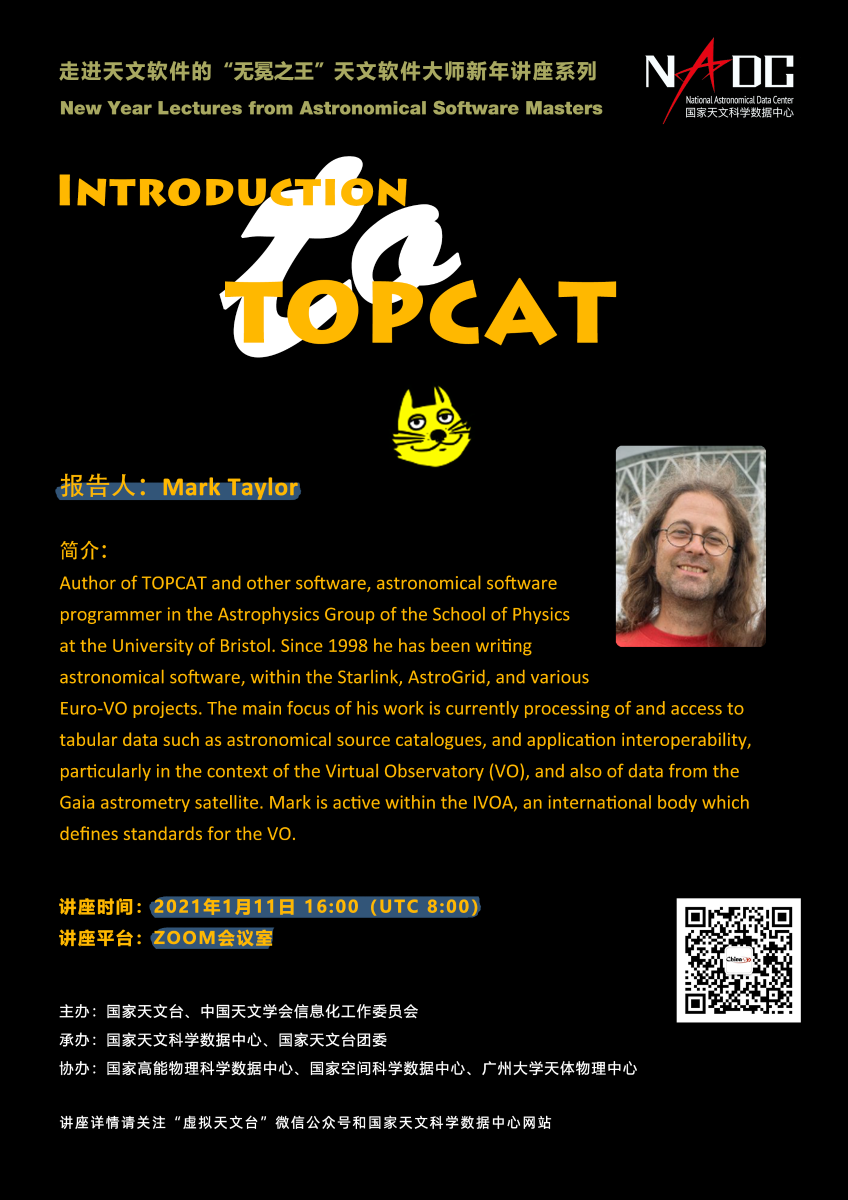
Lecture two
- Title: SIMBAD, VizieR and Aladin: the CDS astronomical tool suite (slides)
- Time: 8:00 UTC on Jan. 18, 2021 (16:00 Beijing Time)
- ZOOM Link: lecture ended
- Offline Meeting Room: NAOC A308
- Recordings: YouTube, B站
- Speaker: Pierre Fernique
- Short Bio:
Pierre Fernique is the Technical Director of the Strasbourg Astronomical Data Centre (CDS). He obtained his PhD in computer science in 1994 from the University of Strasbourg. He joined the Observatoire de Strasbourg in 1996. He was in charge of the CDS Aladin project from 2006 to 2019, chair of the IVOA Application Working Group from 2014 to 2018, first author of MOC (2014) and HiPS (2017) IVOA standards.
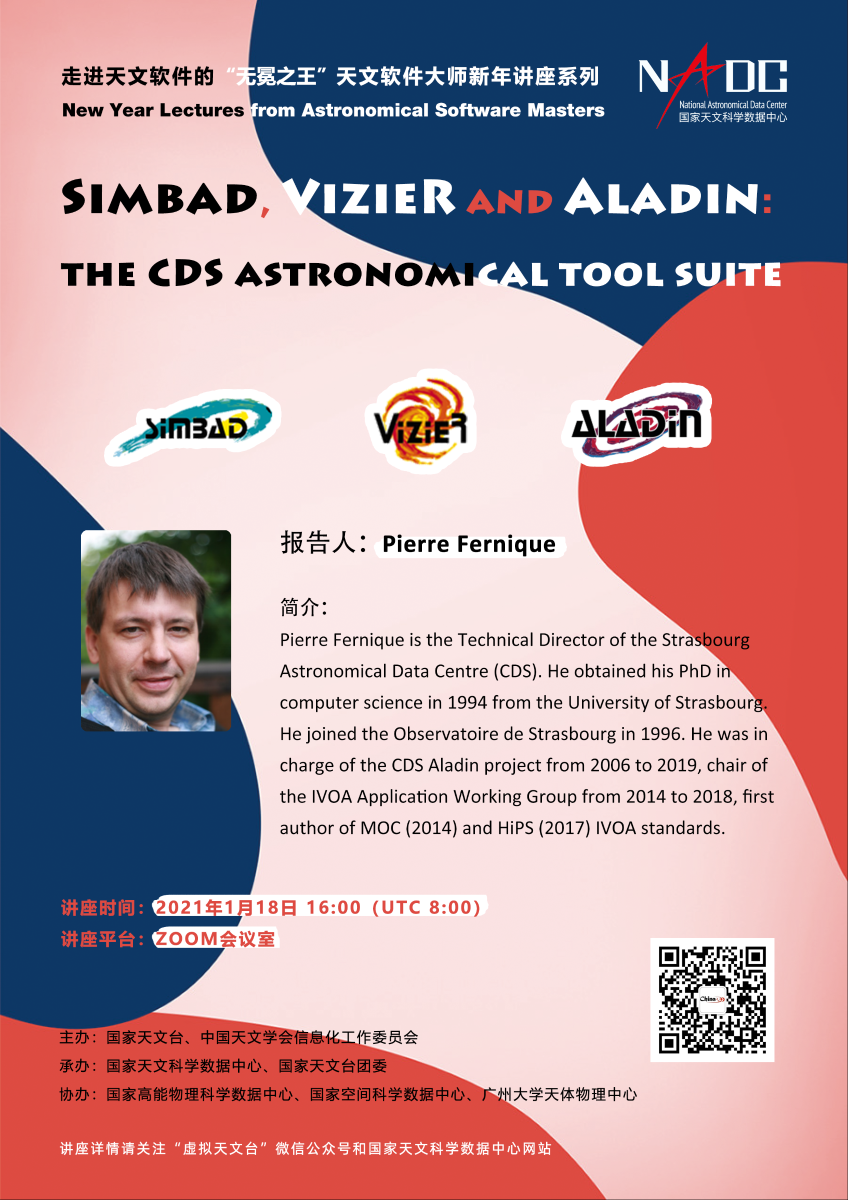
Lecture three
- Title: Advanced features of SAOImageDS9 (slides)
- Time: 1:00 UTC on Jan. 26, 2021 (09:00 Beijing Time)
- ZOOM Link: lecture ended
- Offline Meeting Room: NAOC A408
- Lessions: http://ds9.si.edu/china-vo/
- Recordings: YouTube, B站
- Speaker: William Joye
- Short Bio:
Software Engineer with 40 years of experience in software development, computer graphics, digital signal processing, and image processing. Received a degree of Master of Science Electrical Engineering from Georgia Institute of Technology, Atlanta, GA, USA. Currently a staff member of 25 years at High Energy Division, Smithsonian Astrophysical Observatory, Harvard-Smithsonian Center for Astrophysics, Cambridge, MA, USA. Creator, author and lead developer of SAOImageDS9, an astronomical imaging and data visualization application.
- Abstract:
SAOImageDS9 continues to grow and evolve to support the needs of today's Astrophysical community. After 22 years of continuous development, DS9 has been reimagined and refactored for implementation on today’s hardware platforms and operating systems. While maintaining backward compatibly, new features and enhancements have been added in recent years that some users may not be fully aware. Examples include: Themes (Dark Mode) support, an all new FITS file analysis tool (Prism), movie creation using GIF animation, full featured 2D plotting support, 3D data cube visualization, and RGB composite image creation. The lecture will consist of a number of hands-on examples to highlight some of these new advanced features.
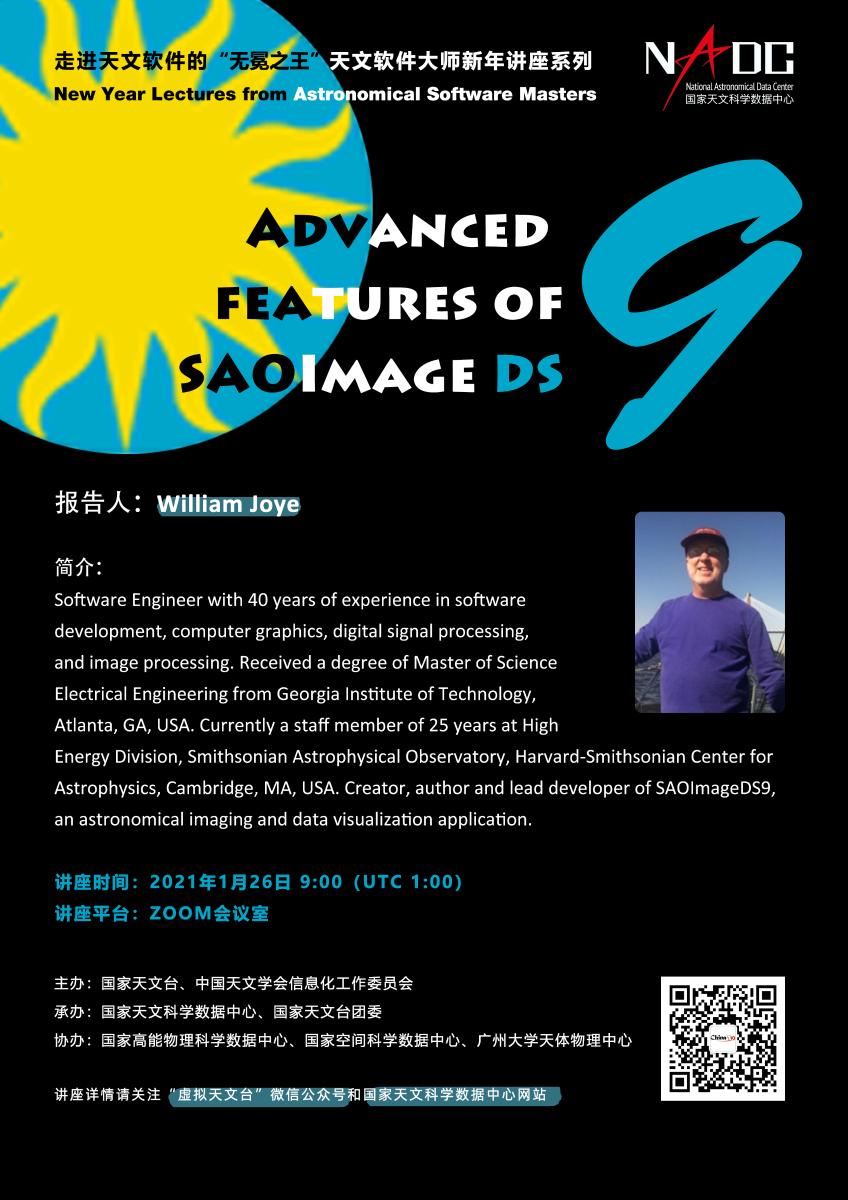
Lecture four
- Title: Stellarium: astronomical simulation for research and outreach (slides)
- Time: 8:00 UTC on Feb. 01, 2021 (16:00 Beijing Time)
- ZOOM Link: lecture ended
- Offline Meeting Room: NAOC A408
- Recordings: YouTube, B站
- Speaker: Georg Zotti
- Short Bio:
Georg Zotti is computer scientist and cultural astronomer. During his post-doctoral research on the possible astronomical orientation of Neolithic circular ditch systems in Austria (2008-12) he has joined the Stellarium development team to add unique program features geared towards modern virtual archaeoastronomy, also with students of TU Wien (Vienna Univ. of Technology). He is still working on a few accuracy issues and functional improvements for research and outreach, time permitting. His daytime work currently includes also applications of remote sensing and geographic information systems for archaeological prospection and graphic-heavy installations for archaeological exhibitions.
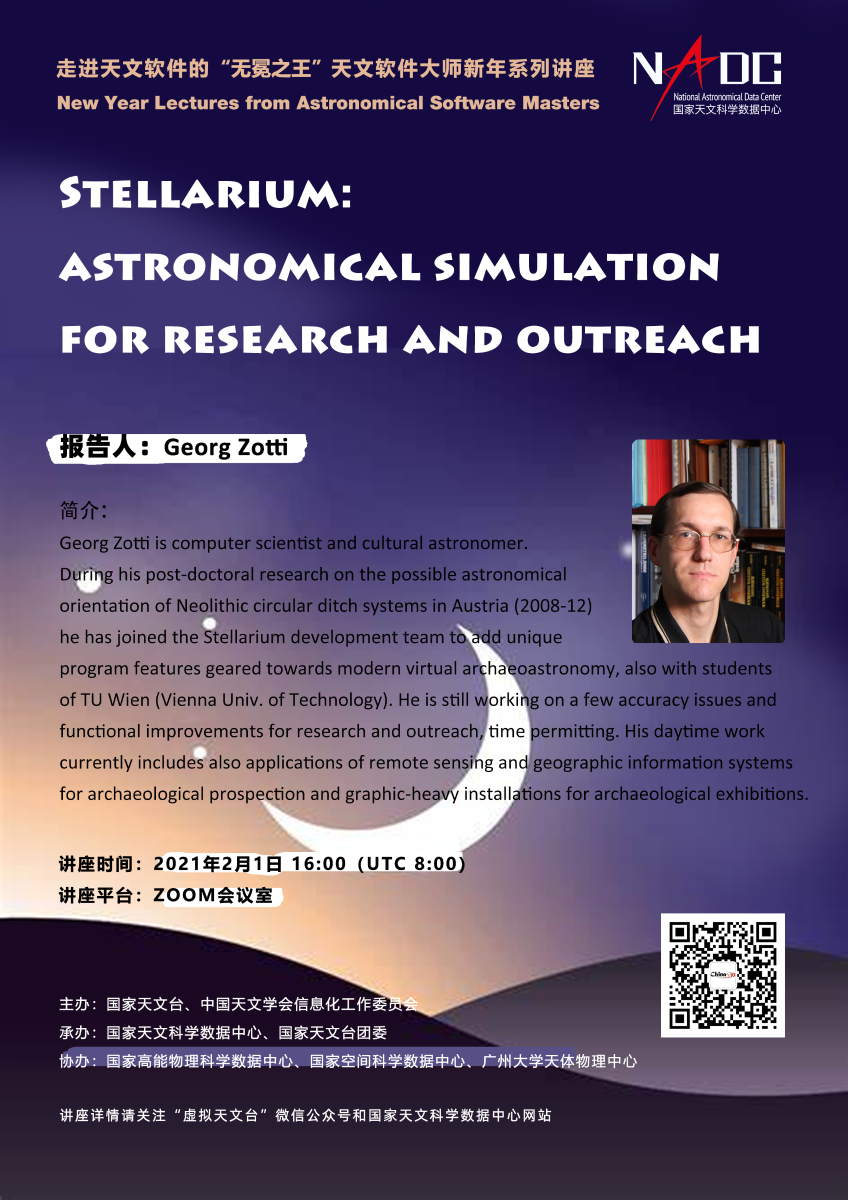

.png)